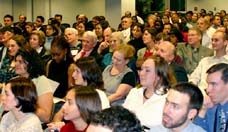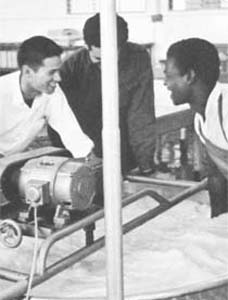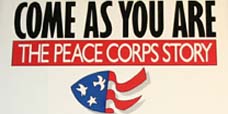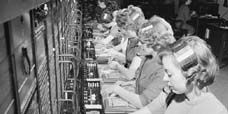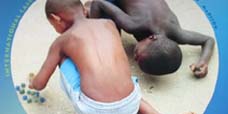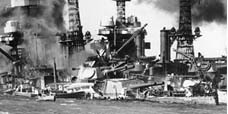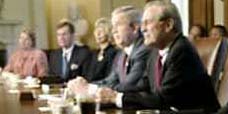
China RPCV Mike Meyer writes “The World’s Biggest Book Market” on the China publishing scene
The World's Biggest Book Market
By MIKE MEYER
Published: March 13, 2005
Here is a red dinosaur that demands our attention. The cartoon character, named Gogo, bounces on a monitor inside China's largest bookstore. ''Do you like doughnuts? Do you like burgers? Do you like sandwiches?'' he sings in English.
''Yes I do!'' the subtitles prompt. But the audience misses its cue. Look at them ignoring Gogo: a seated bundle of green hand-knit sweaters, black pigtails and bowed heads . . . reading. They're poring over cartoons -- translations of ''Calvin and Hobbes'' and of Japanese manga -- and the locally drawn ''Legend of Nezha'' books, which held 10 of the top 11 places on a Chinese best-seller list last year. Others turn the pages of a Garfield English-Chinese dictionary, which contains no entry for lasagna, but one for tofu.
Forty focused children crouch on Book City's fourth floor, and 40 more gather at the neighboring nook, and 40 after that. It's calming to reach this pool of prepubescence amid the chaos that is Book City, whose five floors hold 230,000 titles.
Downstairs, the crowds are dense and the juxtapositions jarring. ''Monica's Story'' lies between Bill Clinton's and Hillary Clinton's autobiographies. A box set of books about Hermann Goering rubs shoulders with ''What's Behind Jewish Excellence?'' American titles in Chinese translation range from the predictable -- ''The Da Vinci Code'' and the Atkins diet -- to the surprising: Henry Rollins's ''Get in the Van,'' a memoir of his punk years, and a collection of Woody Allen books whose Chinese title promises ''Mensa Whores.''
But translations into Chinese make up only 6 percent of the 190,000 books printed in China in 2003. Instead, the world's fastest-growing book market -- adding an estimated $300 million in sales annually -- is fueled by textbooks, which account for nearly half of all purchases. (This is according to China's statistical yearbook and a definitive book on publishing, which offer the most reliable figures available on the Wild West atmosphere of the Chinese book market.)
At Book City, shoppers face an entire floor of English-learning materials. One, ''Love English,'' offers pick-up lines and pillow talk with cultural hints. Among its instructions: that '' 'I'm bored' really means: 'Do you want to have sex?' '' Practice cassettes are included.
At the store's entrance, a red banner urges shoppers to ''Maintain Communist Party Members' Advanced Character.'' This is, after all, a state-owned shop. Eighty percent of China's 72,000 booksellers are private, but nationalized stores ring up two-thirds of sales. At Book City, the Communist Party tracts sit neglected. Instead, crowds jostle toward a nearby shelf with business titles like ''Confronting Reality,'' ''New Leadership'' and ''Change the Tape of China.''
Book City is overwhelming. The din, the eager customers, the slippery stacks of oversized paperbacks -- hardcovers are less common -- whose covers call out: ''I Was an American Police Officer,'' ''I'm Only Raising You for 18 Years'' and ''Chinese-Style Divorce.'' There's also the 2000 hit ''Harvard Girl,'' the story of how two dedicated Chinese parents groomed their daughter to get into Harvard. The copyright page reads: 63rd edition, 1.76 million copies. It costs just $2.41, the average price for a general interest text, which illustrates the difficulties both foreign and Chinese publishers face in trying to make a profit.
Chinese best sellers often see their themes repeated. ''Harvard Girl'' quickly gave rise to ''Harvard Boy,'' among others. A whole pack of lupine imitators followed the successful novel ''Wolf Totem.'' Even banned books get knocked off. The muckraking ''China Peasant Survey,'' about the plight of China's peasant farmers, has spawned a look-alike called ''China Migrant Worker Survey.''
Outside Book City, the view is pure New Beijing: bigger, wider, flatter, more. The squat buildings still feel new; memories of the old neighborhood linger. A man reminds me that before one of the capital's 44 Starbucks opened across this square of brown grass, before Book City, this was the site of Democracy Wall, where Beijingers posted demands for openness and reform. Now, they shop for books. In fact, Book City has so many customers that it figures into the planning for the 2008 Beijing Olympics. Plans call for doubling the existing building so it can accommodate 200,000 shoppers at once.
After a decade in China, I thought I'd seen it all: murder, jail, aliens, rodeo. But nothing prepared me for its publishing industry, in puberty.
'Doing business here is like playing ice hockey without referees,'' says Toby Eady, a London-based literary agent who represents several authors who have written on China. They include Jung Chang, who wrote the popular novel ''Wild Swans''; Ma Jian, a dissident who wrote the political travelogue ''Red Dust''; and Tim Clissold, the author of the business memoir ''Mr. China.'' In China, Eady says, ''a contract is good until you step 10 centimeters out of the office.''
Advertisement
Adrian Zackheim, the publisher of the Penguin Group's business imprint, Portfolio, has a similar take. ''When I walked into a Beijing bookstore, I felt like a Russian émigré in New York, seeing his first supermarket,'' he says. ''Book publishing in China seems deliciously complicated. Though I might not be so charmed by it if I had to make my living there.''
It's a constant struggle for many Chinese presses. ''My first concern is survival,'' says Yan Ping, publisher of the privately owned Lightbooks, whose catalog includes books by Paul Theroux and Dr. Phil. ''At this point, success is secondary.'' Yan has reason to worry. Technically, his press -- along with all of China's private publishers -- is illegal.
''Chinese publishing is divided into three sectors: publishing, printing and distribution,'' explains Xin Guangwei, a director at the General Administration of Press and Publication, the regulatory body that oversees publishing. ''Printing and distribution are open to private and foreign investment, and beginning this month, so is retail. Publishing, however, remains under the control of the 568 state-owned presses.''
As the author of ''Publishing in China: An Essential Guide'' (Thomson, 2004), Xin is the Chinese industry's foremost bridge to the West, and a sort of effusive Rosetta Stone. Over tea at the private bookstore attached to the national legislature, he did his ambassadorial best to show that the industry was as clean and clear as the diagrams he drew for me on the backs of his press clippings.
In reality, the situation is far less defined. At the heart of the state press's power is its control of the nation's market in International Standard Book Numbers, or ISBN's, the bar-code-like number that identifies a book for commercial consumption. Without one, a book can't be published in China, with the exception of party tracts and state-sanctioned religious texts. (Among the religious books on sale at the Xishiku Cathedral in Beijing are Bibles, the catechism and ''God, Country, Notre Dame,'' the autobiography of the university's former president).
But as in so many other sectors of China's economy, a parallel, unofficial market in ISBN codes has mushroomed among China's estimated 30,000 private publishers. Known as ''culture houses'' or ''booksellers,'' they act like packagers: finding titles, buying rights, and shopping them to state-owned publishers, who will issue an ISBN for a fee ranging from $1,250 to $2,500, then publish the book under the state imprimatur. Agreements can also include the sharing of production costs, marketing and distribution.
It's considered an openly illegal system, tolerated to a point. Officially, the buying and selling of ISBN's is forbidden. In a round of recent speeches aimed at culling pornography and other ''illegal publications jeopardizing social stability,'' government officials vowed to crack down on culture houses, calling them ''malignant tumors that must be excised.''
The question is at what cost. ''Private publishers are doing an extremely valuable job,'' says Andrew Nurnberg, whose London-based literary agency specializes in foreign rights. In the West, packagers are often considered ''hired help,'' he says. But in China, it's the reverse. Although the state ostensibly controls publishing, it relies on the private culture houses to do the heavy lifting.
Paul Richardson, the founder of the Oxford International Center for Publishing Studies and a close watcher of the Chinese publishing scene, anticipates that one day the General Administration of Press and Publication will sell book numbers itself, and ''legitimize'' the entire process. There are ''clear messages from officials this is coming,'' he says.
For now, culture houses provide private entrepreneurs the only door into the industry. Even then, it's a struggle. Gao Yun, a photographer, and his wife, Cheng Yanbin, an editor, poured their life savings into creating the ''China on Foot'' guidebooks. They found a willing partner in China's largest tourism press. ''We invested $50,000 in our ideas,'' Ms. Cheng says, proudly patting the book's cover. ''This is our car; this is our house.''
Advertisement
The story of Yang Erche Namu, a Beijing author and onetime popular singer, is also telling. Namu has published 12 books in Chinese, and her memoir, ''Leaving Mother Lake,'' was released in 2003 by Little, Brown. After an editor commissioned her first book, Namu was handed a bag with $10,000 in cash -- and no rights. She estimates the book sold two million copies, not counting pirated editions. In China, authors and editors rarely forge a lasting bond. For each of her successive 11 books, Namu has worked with a different publisher. Now they pay advances against royalties, but, given unreliable sales data and piracy, she says she still can't support herself from writing. Instead, she relies on income from guesthouses she owns in her native village. She has also started a lingerie line, for which she is seeking backers. ''I am famous, everyone knows me, but I have no money!'' she says with a laugh.
These are the stories that make agents wince. Yet compared with the West, agents play a much smaller role in the Chinese industry. A few dozen cover the entire nation, and only three firms represent translation rights.
Agents and American publishers say the average amount they receive for Chinese rights is a paltry $2,500, which is what a Chinese publisher paid for the hugely successful business book ''Who Moved My Cheese?'' It became China's all-time best-selling translated work, with official sales of two million.
''Of our 30,000 contracts, 60 percent are paying,'' says Luc Kwanten, the head of the Big Apple Tuttle-Mori literary agency, which has branches on the mainland and Taiwan. ''Publishers are conscious of the fact that royalties have to be paid. And the publishers do have money,'' he says. ''There is still a trend to view this as a poor country. It's not a poor industry. It's still a wide-open market, like a dry sponge. It senses the water, but isn't there quite yet.''
China's book sales totaled an estimated $5.6 billion in 2003, compared with $23.4 billion in the United States. Web sales are fledgling in China, due in part to a reliance on cash-on-delivery payments, but book-selling Web sites deeply discount the standard 40 percent markup over wholesale prices. Popular portals include dangdang.com and joyo.com, which Amazon bought for $75 million last year. There are also book clubs. The Bertelsmann Group runs one based in Shanghai with 1.5 million members. It has also invested in a bookstore chain.
Tracking sales remains a challenge, although most publishers have made a gesture toward transparency by listing print runs on a book's copyright page. The Beijing OpenBook Market Consulting Center tabulates best sellers by genre in the weekly China Book Business Report, and tracks sales data for Chinese retail book purchases. ''I went to a bookstore in London once,'' Zhu Xiaoli, a manager at OpenBook, says. ''It was so calm, with so few people. I asked the saleswoman: 'How can you make any money?' ''
Because of piracy, the same question is constantly asked of China. Not everyone answers eagerly. When I asked one publisher about piracy, he plunged into a polemic about my exterminating the American Indians, angrily stabbing his palm with his finger. Xin Guanwei, Chinese publishing's Rosetta Stone, compares the heightened campaign to protect intellectual property rights to America's war on drugs. ''Piracy is our drug problem,'' he says.
It's not going to be easy. On my desk sit a pack of fake Marlboros, a knockoff Allen Iverson silver medallion, a bootleg DVD of ''The Aviator'' and a copy of the best seller ''No Excuse!'' whose credited author is Ferrar Cape, West Point graduate and motivational speaker, but who is rumored to be a Chinese invention.
Increasingly, however, infringement cases are being heard. In the last two months, the copyright holders of Peter Rabbit and Garfield won piracy suits. One of China's best-known novelists was found guilty of plagiarizing parts of the romance novel ''Falling Blossoms in Romantic Dreams.'' To top it off, last month a Chinese author won his case against a Web site that had illegally posted his material. Its subject? Protecting intellectual property rights.
The control of foreign content is also loosening, to a point. Last year, a Chinese publisher offered to buy the rights to ''River Town: Two Years on the Yangtze,'' by Peter Hessler, a Beijing-based writer who contributes to The New Yorker. Hessler passed after learning that unspecified parts would be cut. ''The point is to be honest to the people you write about,'' Hessler says. ''It's condescending to them to allow the material to get softened. I have faith that one day it will be translated directly.''
Advertisement
Indeed, the government has become less restrictive of some genres, among them history and health -- that is, sex -- by Chinese writers, and law and political thought by foreigners. Lindsay Waters, an editor at Harvard University Press, recalls being approached by a former Red Guard in 1998: ''He said, 'Do you know that I used to destroy books? Now I'm helping to bring in John Rawls's 'A Theory of Justice.' '' Last year, Waters published ''China's New Order'' by the political scientist Wang Hui, which would probably never have seen the light of day in China.
When it comes to exporting culture, not goods, America enjoys a ballooning trade surplus with China. Of the estimated 12,000 translations published here in 2003, nearly half were of American books, a ratio consistent over the past five years. Try naming more than a handful of books by Chinese authors published in America in that time.
Lauren Wein, the associate rights director for Grove Atlantic, says she has been surprised at the range of titles the Chinese have bought from Grove, including ''The Hungry Gene,'' about obesity, and a book by the experimental gay writer Dennis Cooper. But for the most part, ''China wants the heavy hitters, like 'Sex and the City' and 'Cold Mountain.' '' After all, she says, ''They still have 'On the Road' to publish.''
In fact, the first Chinese edition of Kerouac's classic appeared in 1989. For years, I had been looking for its translator, the Beats' sole messenger to China. I finally tried Google.
Wen Chu'an answered his phone at Sichuan University, where he teaches, among other subjects, Beat Studies. The photo on the jacket of his translation of ''Howl'' -- ''Hao jiao'' -- shows a wan, middle-aged man with a comb-over.
Before I phoned, I'd spent the day sifting through all my notes on Chinese publishing, and my eyes were glazing over at the statistics. All this talk about the book business -- potential growth and infrastructure flaws -- had turned texts into a commodity, no different from cars or socks.
Then I asked Wen the obvious. Yes, he had seen the best minds of his generation destroyed by madness. But why translate Kerouac and Ginsberg? ''Because the impact of these Beat editions on readers is great,'' he said. ''Chinese young people can find something inspiring and encouraging in the Beat lifestyle: the ardent love of freedom in action and speech, the firm stand against everything inhuman, the giving priority to the spiritual life and denying the attitude that money-seeking is everything.''
Both of Wen's Ginsberg titles have an official print run of 20,000. ''On the Road,'' which Wen says is available free online in China, had sold 30,000 copies by 2002. Small potatoes next to Chinese sales of management guides like ''The West Point Way of Leadership.''
But wait. ''I believe there are pirate editions by unofficial private publishers,'' Wen continued. ''So actually, the numbers are much more than that.''
He didn't sound at all upset.
Mike Meyer went to China in 1995, via the Peace Corps. He is writing a book about the destruction of historic Beijing, where he lives.







